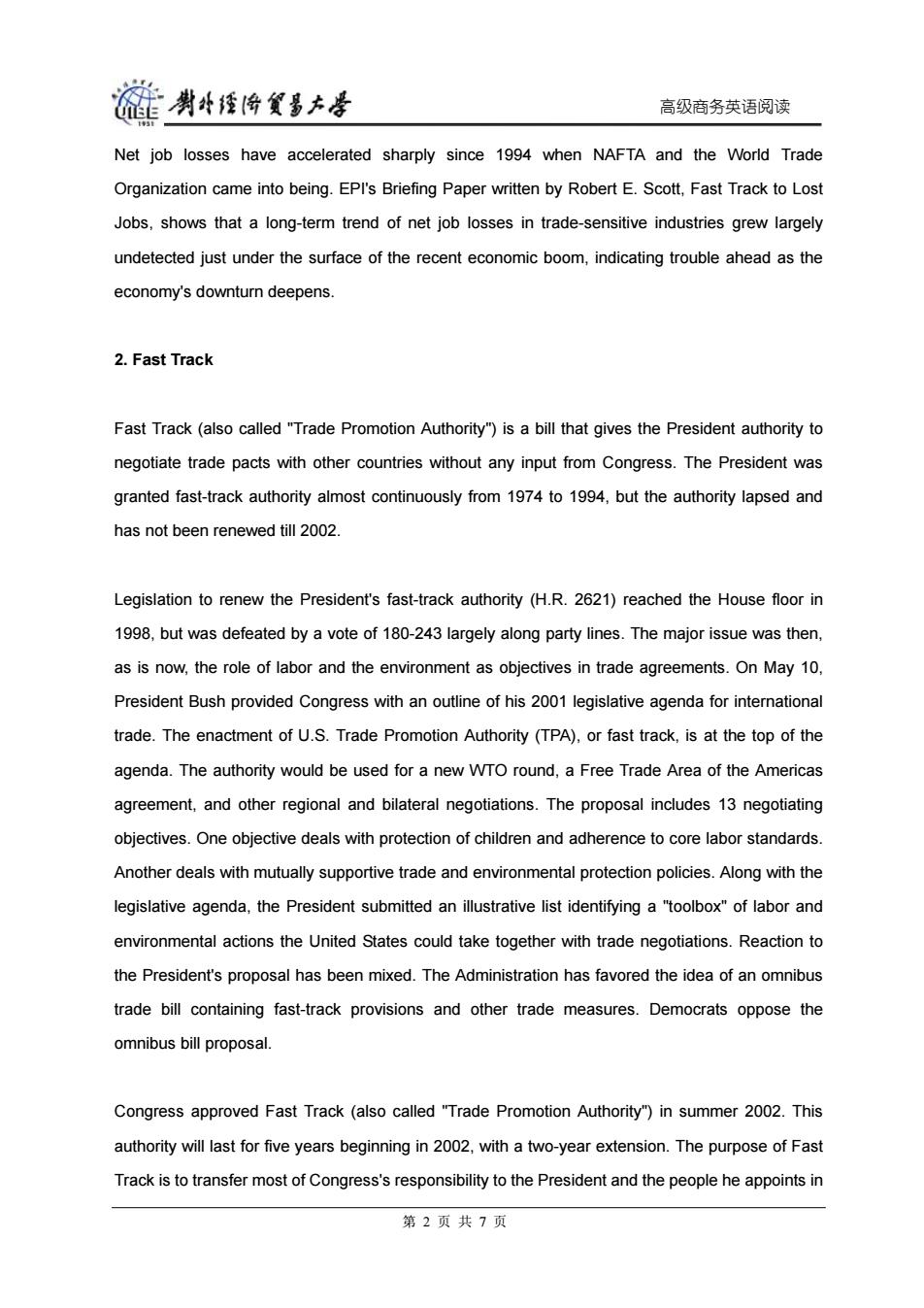正在加载图片...

链男4经降贸多大是 高级商务英语阅读 Net job losses have accelerated sharply since 1994 when NAFTA and the World Trade Organization came into being.EPI's Briefing Paper written by Robert E.Scott,Fast Track to Lost Jobs,shows that a long-term trend of net job losses in trade-sensitive industries grew largely undetected just under the surface of the recent economic boom,indicating trouble ahead as the economy's downturn deepens. 2.Fast Track Fast Track(also called "Trade Promotion Authority")is a bill that gives the President authority to negotiate trade pacts with other countries without any input from Congress.The President was granted fast-track authority almost continuously from 1974 to 1994,but the authority lapsed and has not been renewed till 2002. Legislation to renew the President's fast-track authority (H.R.2621)reached the House floor in 1998,but was defeated by a vote of 180-243 largely along party lines.The major issue was then, as is now,the role of labor and the environment as objectives in trade agreements.On May 10, President Bush provided Congress with an outline of his 2001 legislative agenda for international trade.The enactment of U.S.Trade Promotion Authority(TPA),or fast track,is at the top of the agenda.The authority would be used for a new WTO round,a Free Trade Area of the Americas agreement,and other regional and bilateral negotiations.The proposal includes 13 negotiating objectives.One objective deals with protection of children and adherence to core labor standards. Another deals with mutually supportive trade and environmental protection policies.Along with the legislative agenda,the President submitted an illustrative list identifying a "toolbox"of labor and environmental actions the United States could take together with trade negotiations.Reaction to the President's proposal has been mixed.The Administration has favored the idea of an omnibus trade bill containing fast-track provisions and other trade measures.Democrats oppose the omnibus bill proposal. Congress approved Fast Track(also called "Trade Promotion Authority")in summer 2002.This authority will last for five years beginning in 2002,with a two-year extension.The purpose of Fast Track is to transfer most of Congress's responsibility to the President and the people he appoints in 第2页共7页高级商务英语阅读 Net job losses have accelerated sharply since 1994 when NAFTA and the World Trade Organization came into being. EPI's Briefing Paper written by Robert E. Scott, Fast Track to Lost Jobs, shows that a long-term trend of net job losses in trade-sensitive industries grew largely undetected just under the surface of the recent economic boom, indicating trouble ahead as the economy's downturn deepens. 2. Fast Track Fast Track (also called "Trade Promotion Authority") is a bill that gives the President authority to negotiate trade pacts with other countries without any input from Congress. The President was granted fast-track authority almost continuously from 1974 to 1994, but the authority lapsed and has not been renewed till 2002. Legislation to renew the President's fast-track authority (H.R. 2621) reached the House floor in 1998, but was defeated by a vote of 180-243 largely along party lines. The major issue was then, as is now, the role of labor and the environment as objectives in trade agreements. On May 10, President Bush provided Congress with an outline of his 2001 legislative agenda for international trade. The enactment of U.S. Trade Promotion Authority (TPA), or fast track, is at the top of the agenda. The authority would be used for a new WTO round, a Free Trade Area of the Americas agreement, and other regional and bilateral negotiations. The proposal includes 13 negotiating objectives. One objective deals with protection of children and adherence to core labor standards. Another deals with mutually supportive trade and environmental protection policies. Along with the legislative agenda, the President submitted an illustrative list identifying a "toolbox" of labor and environmental actions the United States could take together with trade negotiations. Reaction to the President's proposal has been mixed. The Administration has favored the idea of an omnibus trade bill containing fast-track provisions and other trade measures. Democrats oppose the omnibus bill proposal. Congress approved Fast Track (also called "Trade Promotion Authority") in summer 2002. This authority will last for five years beginning in 2002, with a two-year extension. The purpose of Fast Track is to transfer most of Congress's responsibility to the President and the people he appoints in 第 2 页 共 7 页